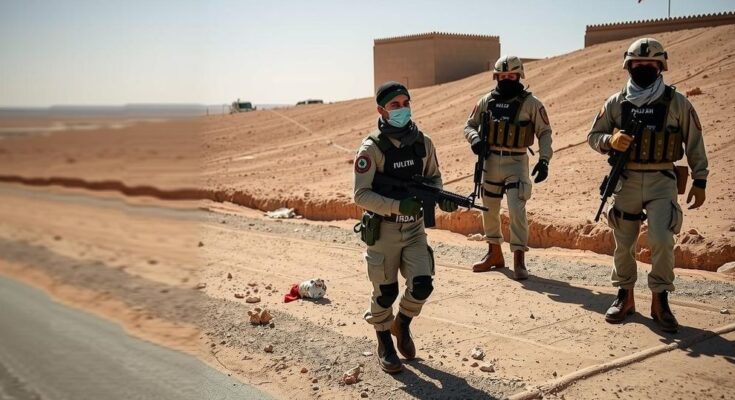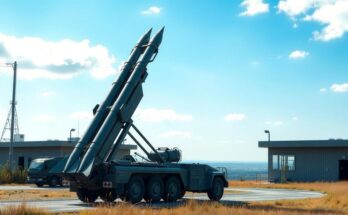Jordan has intensified military operations against Iranian-backed drug smuggling networks along its northern border with Syria. This follows violent confrontations with armed groups infiltrating its territory. The Jordanian military has confirmed that these operations are orchestrated by militias funded by Iran. The government has launched airstrikes on drug manufacturing facilities, marking a strategic shift towards a military response. Concerns over rising Captagon trafficking have prompted this aggressive stance, with a joint effort from Syria to combat smuggling activities.
Jordanian forces have heightened military operations along the northern border with Syria, primarily aimed at dismantling drug smuggling networks affiliated with Iranian-backed militias, including Hezbollah. This decisive change follows several violent incidents involving armed groups attempting to enter Jordanian territory. Reports indicate that Jordanian border guards engaged in intense confrontations with smugglers trying to infiltrate from Syria as of January 12, 2025.
The Jordanian military has confirmed that these armed groups are part of an organized network supported by the Iranian regime, focusing on drug and arms trafficking—which play crucial roles in destabilizing the region. Military officials assert that these operations are orchestrated by militias aligned with Tehran, serving to finance their illicit activities. In response, Jordan has conducted airstrikes against drug production facilities situated in southern Syria, marking a shift towards direct military engagement away from previous diplomatic measures.
The Jordanian government has characterized these operations as a “war on drugs,” emphasizing the urgent necessity to secure national borders from these threats. A significant factor behind this intensified response is the rampant proliferation of Captagon, a highly addictive amphetamine, becoming a major source of income for criminal organizations and militias. Furthermore, it has been reported by various sources, including Reuters, that these smuggling operations are closely connected to Iran’s proxy forces and have been operationalized from the Fourth Division of the Syrian Army, historically led by Maher al-Assad.
The relationship between Iranian-backed militias and the drug trade has been well-documented, with UN experts and officials from both the United States and Europe acknowledging that the illicit drug business, particularly Captagon trafficking, serves as a vital financial resource for these factions. Consequently, Jordan and its Western allies have attributed the use of southern Syria as a hub for transporting drugs and weapons to organizations like Hezbollah, which aim to undermine regional stability.
A recent joint security agreement between Jordan and the newly formed Syrian government has bolstered collective efforts to combat cross-border smuggling. Syrian security forces have undertaken actions targeting numerous drug manufacturing sites, many of which were previously shielded by the Fourth Division. Nonetheless, the magnitude of these operations and the immense financial interests involved continue to present challenges to both Jordan and Syria.
Jordan’s strategic actions underscore the broader security threats posed by the overlap of drug trafficking and militia activities in the region. As a Jordanian military official remarked, “This is not just a border issue; it’s a national security imperative. We cannot allow these networks, funded by Tehran, to continue destabilizing the region.”
The topic at hand addresses the increased military response by Jordan against Iranian-backed drug smuggling networks that have been operating along its northern border with Syria. This response is situated within a broader context of regional instability exacerbated by organized militias, notably Hezbollah, that engage in trafficking illicit substances and arms. The collaboration between Jordan and Syria aims to tackle this issue of smuggling, underlining concerns about national security and the effects of drug proliferation in the region.
In summary, Jordan’s military escalation against Iranian-linked smuggling networks signals a critical shift in its approach to national security. By engaging in direct military actions, such as airstrikes on drug facilities, Jordan aims to curtail the destabilizing effects of drug trafficking fueled by Iranian-backed militias. The partnership with Syrian authorities represents a concerted effort to combat the influx of drugs like Captagon, which play a significant role in financing militia activities. As the situation develops, it remains essential for Jordan to mitigate these risks and safeguard its sovereignty.
Original Source: www.ncr-iran.org




